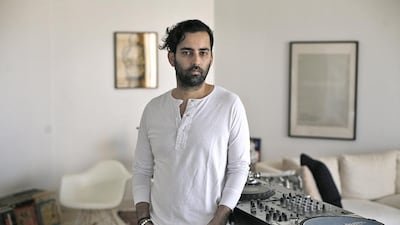KUWAIT CITY // Zahed Sultan aims to get Kuwaiti citizens “online”. That does not mean on the internet. They are already there. It means engaged in the physical world, to encourage them to become more active participants in their communities.
The young man from Kuwait City holds up his iPhone. “It’s like social media,” he says. If people can use the same kind of power that they have on their phones in the real world, Arab societies will become much more participatory and their countries will develop faster, he says.
Mr Sultan, who comes from a prominent Kuwaiti merchant family, says he wants all those likes, shares and comments in the digital world to become civic engagement in the physical world
To this end, he founded the NGO en.v in 2008. That was two years after he had set up the branding company El Boutique Creative Group and realised he wanted to have a more direct influence on society than simply “creating content for consumption”. El Boutique Creative Group became a holding company to organise his ventures.
The NGO’s goal is to “promote social responsibility in the Arab world,” Mr Sultan says. Everyone has some impact on society, whether it is through the work they do, what they consume or their carbon footprint. People need to “look at their lifestyle in a holistic way and make tweaks”, he says. “It’s about a kind of citizen who is aware of their imprint on the system.”
Today, en.v has a number of programmes that aim to influence Kuwaiti society for the better, with a broad focus on education, environmentalism and capacity-building for NGOs.
One of the group’s main programmes is STAND, launched in 2013 to help build up Kuwait civil society through management training and financial support.
Kuwait has one of the most active civil societies among Gulf Arab countries. There are many NGOs and organisations in Kuwait, spanning interests from animals rights to welfare advocacy groups. Yet many of the organisations face challenges when it comes to long-term work, Mr Sultan says. For example, many that were active when en.v was founded no longer exist.
STAND helps organisations create a strong working system, teaches them about internal conflict resolution, handling finances and the best hiring practices, along with issuing grants. To qualify, an NGO has to be active and have executed a project, Mr Sultan says.
Another en.v programme, n-MU, is aimed at “promoting constructive youth engagement in Kuwait”. The year-long programme aims to promote youth engagement in Kuwaiti society by giving them the skills to have a positive impact on their communities. The programme trains youth between the ages of 18-25 in critical thinking, media literacy, citizenship values and skills, and advocacy. Funding is also available for them to carry out their own projects.
Youth unemployment is the key problem facing the Middle East, Mr Sultan says. In the next decade, tens of millions of new jobs need to be created for young people. This makes it especially important to target youth and make them more engaged with their communities.
“If you deal with the youth segment, they don’t have time to wait. They want it now.”
en.v receives financial support from companies including Zain telecom and HSBC. They have also received backing from the United States state department and the Dutch government.
Mr Sultan says his group’s backers must have an “intrinsic” role in Kuwait. They do not want to work with people that are merely a “sponsor”. The NGO cooperates with the Kuwaiti government on some projects, but does not receive financial backing from it.
“There is a perpetual channel of the negative,” Mr Sultan says about Kuwait. “We know that exists. But it’s not all bad. We also get a lot from this country.”
Overall, en.v’s mission is “to activate dormant citizens”, Mr Sultan says. “How do I close the gap ... to making you get involved?”
He adds that while it might seem that many young people in Kuwait are already engaged and active, starting up companies and founding NGOs, they are actually only the “growing minority”.
The majority of the country lives outside of Kuwait City, not in the urban areas where most of Kuwait’s civil society organisations are based.
“That’s the people that we have to reach out to,” he says. “It’s going to take time, but it’s key for them to become engaged.”
jvela@thenational.ae

